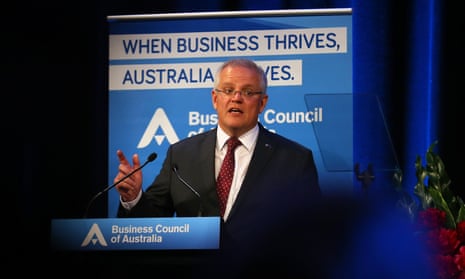It’s possible I have Harold Bloom lodged in my head lately because he loomed large in my youth, and he died recently, but when I listen to Scott Morrison, increasingly I think of Bloom, and The Anxiety of Influence.
If you are too young or productively educated to have encountered Bloom, he is the literary critic who held that all writers have to confront the writers who came before them, in the process creating imaginative space for themselves. Bloom’s theory is more complex than my simple rendering, but that’s the primary idea.
Drawing a line from the thinking of an influential American literary critic to Morrison’s speech this week to the Business Council of Australia might seem a bit eccentric, but bear with me.
Just as Bloom had his poets jousting with the legacy of the great men (and they were most often great men) who preceded them – reading and misreading their contributions as the necessary precursor to their own artistic achievements – Morrison is always locked in mortal combat with Labor who governed, and lost, and could have won the May election, but didn’t, because he was better.
This Labor – part historical reality and part product of Morrison’s tribal imagination, is currently vanquished – but it is always poised to strike once again.
We don’t tend to think of Morrison as a storyteller because he’s at pains to present prosaically. Because he wants you to focus on a curated image of himself as a doing prime minister – the practical guy in the baseball cap, often out and about around the country, hugging, handshaking, solving, triumphing and so on – people can easily miss the storytelling, which is a large component of what he does as a public figure.
He’s not a grand orator, but Morrison’s rhetoric, how he stitches concepts together and gets them amplified (as opposed to interrogated) in the media cycle, is actually central to his prime ministerial enterprise, from branding a group of people the “quiet Australians” (who didn’t know they were the quiet Australians until he called them that – a deft bit of political marketing that deserves more comprehensive analysis) – to the key messages of this particular week.
There were two messages this week. The first message the prime minister wanted to convey is the government is managing the economy by Not Panicking. Related to the first message was the second: the Coalition has decided to provide a new round of stimulus by bringing forward spending on infrastructure, and pressing ahead with some structural reforms to supplement the economic management while Not Panicking. The government is Not Panicking because it is Not Labor. The End.
It’s a funny old business, Morrison Not Panicking on high rotation. Pretty bizarre actually, if you take a minute to think about it.
Outside the world of politics, “I am moving ahead without panicking” would be an odd observation to make unprompted. Just think about this in your own world, if you took to broadcasting to your associates: “Today I am going to work, and I’ll finish that project, and stop by Coles on my way home, and ensure my kid has done his history assignment, and I’ll watch the next episode of The Crown – and I will Not Panic.”
You would sound a bit strange, because no one, even people who love you, care about whether you are doing some or any of these things while not panicking, because it would just be assumed you’d be getting on with things in more or less competent fashion, and if you were panicking, you’d either calm yourself or ask for help. The Not Panicking update would seem pretty superfluous.
But this is politics, of course, not life, and Morrison, if we loop back to Bloom, is still in the process of defining his prime ministerial artistry through interpreting, misinterpreting and slaying his predecessors. So the point of the prime ministerial telling this week was not so much what Morrison was doing (although that was obviously part of it) but what Labor would be doing if anyone was ever foolish enough to allow them to put their hands back on the levers of government.
Labor right now would be screaming, and running around with their undies on their heads, and losing their minds, because Morrison’s opponents, in his persistent telling, are “economic panic merchants” with an unquenchable “appetite for crisis”. So to cut a longish story short, this week, once again, the prime minister invited voters to conclude: thank God Scott won that election. (Hurrah optional.)
The potential resonance of this is not so much the persistent Morrison humblebrag, which I reckon voters are smart enough to take or leave, but his implicit validation of underlying voter anxiety.
Morrison often tells voters either directly or indirectly he knows they are anxious, and sick of the noise, and the political circus, but he wants them to direct their anxiety to his political opponents, not the government.
Morrison, in different ways, but with great persistence, says I know you are worried, but you don’t have to worry, because Daddy is here, he won the election, and he’s Not Panicking. That’s the potency of “hello, I’m Scott, and I’m not panicking” – a declaration that in any other context would be either superfluous or stupid.
So we’ve established Morrison is a storyteller. Now we need to establish a few other things. The first is stories, however well crafted and resonant for the times, don’t insulate politicians from reality. They may for a time, but not forever.
So here are some facts, decoupled from Morrison talking points, branding and myth making. The first fact is Morrison is a fully rusted-on part of the circus he decries, and a significant beneficiary of it, not a disinterested observer, a passing anthropologist, or a prophet who will save politics from itself.
Morrison is politics. That’s what he is.
The second point is the economy isn’t doing that well, and while Morrison likes to present Labor as the economic panic merchants, recent history (that is, facts many of us saw with our own eyes and lived through) shows it was a Labor government, not a Coalition government, that kept Australia out of recession during the global financial crisis.
Labor went on to destroy itself in full public view, killing not one but two prime ministers, but decisive intervention during the GFC remains one of that government’s most important achievements, whether you want to engage in a seminar about whether there was too much stimulus, or whether it was a combination of stimulus and China that prevented a recession, or whether you don’t.
If Labor allows Morrison to rewrite that history, if they allow him to portray them as the party of undies on head, blowing into a paper bag to prevent hyperventilation, then they are … what’s the correct word? Idiots? Not showing up for work? Numpties. Anyway, insert your own word of choice.
Now to what the government is doing, as opposed to saying. The Morrison government is current taking a calculated risk right now that tax cuts, low interest rates, drought spending and infrastructure investments – plus the structural reforms it’s begun to tentatively flag – will be enough to keep the economy moving while still maintaining the surplus.
This position is doubtless formulated with the benefit of high-level advice, and I’m not asserting in this column that I know better than Morrison, and the treasurer and the Treasury. They could be making exactly the right call but it remains a judgment call, one this government has made, and one they will be held accountable for if the various interventions prove to be underdone.
Because my hunch is, at the end of the day, Australians, however they vote, are going to care more about whether they have a job than whether or not the budget is in surplus – and trying to rewrite recent history won’t save Morrison from their anger in the event the Coalition has called this wrongly.

